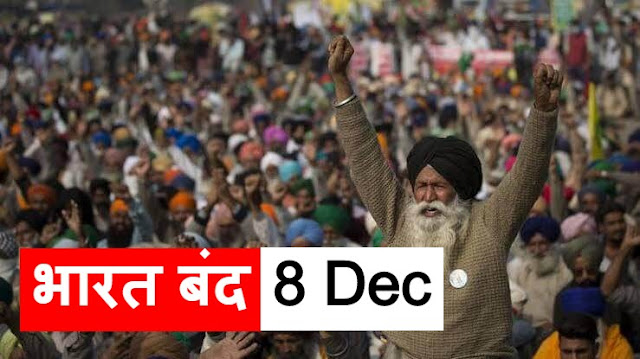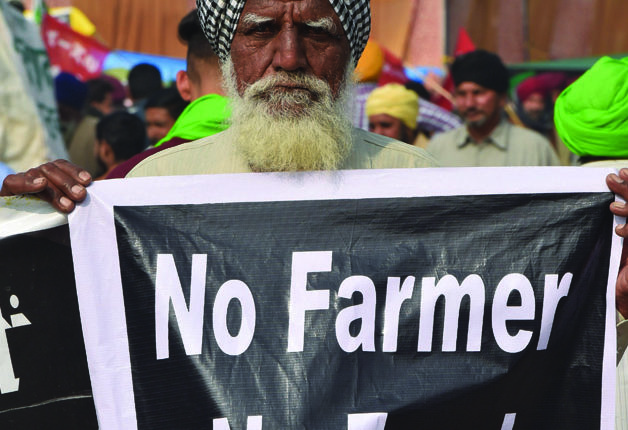BHARAT BANDH ON 8 DEC: WHERE IT CAN IMPACT AND THINGS YOU MUST KNOW
After the fifth round of talks with the government ended in a deadlock, thousands of farmers protesting the Centre's new farm laws stayed put on the borders of Delhi with Haryana and Uttar Pradesh, blocking key routes leading to the national capital that led to long traffic jams.
Many opposition parties have
announced their support to the nationwide strike called on 8 December by
farmers' union in various parts of the country to express solidarity with the
agitators, who have stayed put on Delhi borders for 10 days
Farmers' leaders have said that
they will carry on with the 'Bharat Bandh' (nationwide strike) on 8 December to
mount pressure on the Central Government. The representatives of thousands of
protesting farmers, who are sitting on various borders of Delhi since 26
November, have said their call for a 'Bharat Bandh' would be observed with full
force.
After the fifth round of talks on
Saturday between farmers' leaders and the Centre, the farmers' union stood firm
on their demand against the new Agri-marketing laws and announced that the
government should rollback the three farm laws.
Farmer leaders communicated that
they will hold 'Bharat Bandh' on December 8 as their demands haven't been met.
The farmers are not ready to
accept anything less than the withdrawal of the law. The government is looking
a bit soft but the decision to rollback completely will be an embarrassment for
him. The authorities are outraged over the main objections of the farmers' organizations
that there is a middle path. But the farmers' organizations are finding its
hope less and in such a situation, they want to increase pressure on the
government by calling India off. On Saturday, effigies of Prime Minister
Narendra Modi will also be burnt in many places.
WHERE CAN THE IMPACT OF THE BHARAT BANDH BE SEEN?
Probably everywhere except
essential services. Farmers' organizations have taken over the borders of
Delhi. On December 8, the day of Bharat Bandh, there is preparation for Chakka
Jam across the country. There will be an attempt to influence railway services
as well. There may be widespread impact of the bandh in agro-based areas. There
is every possibility of a bad impact from the market to normal life. The supply
chains and transport services may break back due to roads being blocked. If
political parties also come out in support of the Bharat Bandh, then the scope
of its effect may increase further. Farmers' organizations have said that the
emergency and essential services should be kept away from the bandh.
What are the farmers agitating
for?
The farmers are opposed to the
three recently enacted laws by the central government. These three bills
directly affect the agricultural sector of the country. Let us understand what
is in these laws and why they are being opposed.
1. LEGISLATION REGARDING
AGRICULTURAL MARKETS:
Agricultural Produce Trade
and Commerce (Promotion and Simplification) Act - 2020
WHAT IS IN LAW?
·
To be an ecosystem where farmers and traders can
get freedom to sell and buy 'Mandis' under state APMCs.
·
Promote barrier-free interstate and infra-state
trade of crops.
·
Providing framework for electronic trading.
WHY THE PROTEST?
·
States will lose revenue as farmers will not
have to pay 'mandi fee' if they sell crops outside the registered APMC mandis.
·
What will happen to the 'commission agents' in
the states if all the farming trade goes out of 'mandis'?
·
This may end MSP-based procurement arrangements.
·
Electronic trading like e-NAM has the same
system as mandi. What will happen to e-NAM if the mandis are closed due to lack
of trading?
2. NEW LAW ON CONTRACT
FORMING
Farmers (Empowerment and
Protection) Agreement on Price Assurance and Agricultural Services Act 2020
WHAT IS IN LAW?
·
Farmers will be able to contract the future crop
directly from agri-business firms, processors, wholesalers, exporters and large
retailers at a pre-determined price.
·
Farmers with less than five hectares of
agricultural land will benefit through aggregation and contracting (86% of
total farmers in India in this category)
·
Transferring the risk of market uncertainty from
farmers to sponsors.
·
To provide better inputs to farmers through
modern technology.
·
Reduce marketing costs and increase farmers'
income.
·
To get the full price, farmers can sideline
middlemen and deal directly.
WHY IS THERE OPPOSITION?
·
In contract farming, farmers will have less
bargaining power.
·
The sponsors may not like deals with small
farmers.
·
If there is a dispute, private companies,
wholesalers and processors will have better legal options.
3. COMMODITIES LEGISLATION:
Essential Commodities
(Amendment) Act 2020
WHAT IS IN LAW?
·
Exclude crops like cereals, pulses, oil onions
and potatoes from the list of essential commodities. This would leave them out
of the stock holding limit (exceptions in exceptional circumstances).
·
This will give a boost to private sector / FDI
in agriculture sector as the fear of interference from investors will be
lessened.
·
Cold storage, investment will come to modernize
the food supply chain.
·
Both farmers and consumers will be helped to
stabilize prices.
WHY THE PROTEST?
·
The services of fixed prices for 'exceptional
circumstances' are so much that they may never be implemented.
·
Large companies will be allowed to deposit
stocks, that is, they can run the farmers as per their own.
·
Confusion on the onion by its recent ban on
onion export ban.
HERE ARE MAJOR UPDATES:
1) 14 opposition parties,
including Congress, AIUDF and the Left, in Assam announce their "full
support" to 'Bharat Bandh.'
2)The NCP on Sunday joined other
opposition parties in extending support to the call of Bharat Band. In addition
to that, Maharashtra NCP unit president Jayant Patil said in a statement that
the party workers will join the Tuesday shutdown in protest against passing of
the Agri laws by Parliament without holding discussions.
3) Various opposition parties
have announced support to the ‘Bharat Bandh’ called on 8 December by farmers in
various parts of the country to express solidarity with the agitators, who have
stayed put on Delhi borders for 10 days.
4) The Congress party has
expressed its "whole-hearted" support to the nationwide strike called
by the agitating farmers against the three farm laws and said that it will hold
protests that day at all district and state headquarters in solidarity with the
demands of the farmers. Addressing a press meet at the AICC headquarters in
Delhi, Congress spokesperson Pawan Khera said, "I would also like to
announce that the Congress party extends its whole-hearted support to the Bharat
Bandh on December 8."
5) On why govt is facing
problems, NCP Chief Sharad Pawar said, "When Bill was being passed, we'd
requested govt that they shouldn't be in a hurry, it should be sent to Select
Committee & a discussion is needed, but that didn't happen and the Bill was
passed in haste. Now govt is facing problems because of that haste."
6) The Telangana Rashtra Samithi
on Sunday extended support to the 8 December 'Bharat Bandh' call by various
farmers' organizations and farmer leaders against the govt's new farm laws. TRS
chief and Chief Minister K Chandrasekhar Rao said the party rank and file would
actively participate in the bandh to ensure it was a success. "We'd
opposed the Bills in Parliament; we continue to do so. MSP hasn't been assured
in any of these Bills. Also, if mandi structure is dismantled there's no
alternative structure in this country, so farmer is insecure. TRS will support
the farmer' Bandh call," said K Kavitha, TRS MLC.
7) The ruling Trinamool Congress
in West Bengal has decided to extend its "moral support" to the 8
December nationwide strike and would stage sit-ins in various areas for three
days.
8) The Communist Party of India
(Marxist), Communist Party of India, Communist Party of India
(Marxist-Leninist), Revolutionary Socialist Party and All India Forward Bloc,
in a joint statement, announced their support to the countrywide strike.
9) Opposition parties led by
RJD's Tejashwi Yadav in Patna were allowed to hold a brief protest against new
farm laws at the statue of Mahatma Gandhi at the Gandhi Maidan, where they
pledged to support the agitating farmers. Tejashwi said, "I am standing
with the Anndata (providers of food) in their fight against the Dhandata
(people who own wealth)." "Is it a crime to raise voice in support of
farmers demanding provision for Minimum Support Price (MSP) in the newly
enacted laws. If it is a crime, then we will commit such crime every
time," he said on Twitter.
10) The joint forum of trade
unions that has supported the farmers’ protest includes Indian National Trade
Union Congress (INTUC), All India Trade Union Congress (AITUC), Hind Mazdoor
Sabha (HMS), Centre of Indian Trade Unions (CITU), All India United Trade Union
Centre (AIUTUC) and Trade Union Co-ordination Centre (TUCC).
11) A number of bank unions have
also expressed their solidarity with farmers protesting and requested the
Centre to resolve the issue at the earliest. Officer unions All India Bank
Officers' Confederation (AIBOC), All India Bank Officers' Association (AIBOA)
and Indian National Bank Officers' Congress (INBOC) have also requested the
govt to initiate meaningful dialogue to resolve the impasse by referring the
bills to a select committee by a special Presidential Order.
12) The farmers are protesting
against the Centre's new farm laws -- the Farmers (Empowerment and Protection)
Agreement of Price Assurance and Farm Services Act, 2020; Farmers Produce Trade
and Commerce (Promotion and Facilitation) Act, 2020; and The Essential
Commodities (Amendment) Act 2020.




Comments
Post a Comment